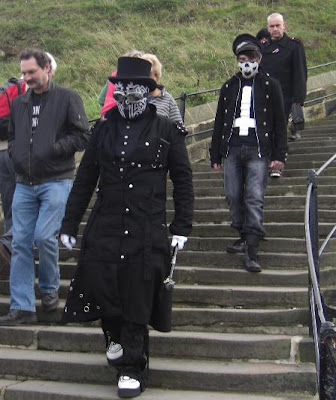Whitby church is falling down,
buried bones are raining free
on the kipper-smoking town
by the heavy rolling sea.
Will they find a damaged rib,
wooden stake through darkest heart?
Surely vampires are a fib –
nonsense tales right from the start.
If you wander on the beach
when day trippers have all gone
normal rules slip out of reach,
like the sun that almost shone.
Beware the slavering dog
leaping on to harbour wall,
hard to be sure in sea fog
now smothering almost all.
We can’t stop the cliff sliding;
gales through the Abbey remains.
Is it death we hear riding,
or whistle of toy steam trains?
A row of houses was lost
- too much water underground;
and often the storms release
a sudden, unearthly sound.
 Strange folk on the steps to Whitby Abbey and church
Strange folk on the steps to Whitby Abbey and church
 According to my English dictionary haiku means: amusement in verse; Oxford Dictionaries differ slightly with: light verse, and add that it’s a Japanese poem of seventeen syllables, in three lines of five-seven-five, traditionally evoking images of the natural world; and also that it can be a poem in English written in the form of a haiku.
According to my English dictionary haiku means: amusement in verse; Oxford Dictionaries differ slightly with: light verse, and add that it’s a Japanese poem of seventeen syllables, in three lines of five-seven-five, traditionally evoking images of the natural world; and also that it can be a poem in English written in the form of a haiku.
The great haiku master Basho died in 1694 at the age of fifty; it was common in those days to observe a few other rules of composition, which many of us have deliberately disregarded in the micro-poetic world of today.
Twitter, with its limitation of 140 characters, has surprisingly provided a platform for all manner of short form poetry celebrating many of the mundane, and eternal themes such as love, life, death, and the natural world. Perhaps, even Basho would accept that in the 21st century we should be allowed to express ourselves more freely and decide the contents of the haiku rule book – if we have one.
Our main concern should simply be to attempt the creation of something meaningful, simple, & beautiful that might resonate with fellow human beings.
> Click here to get this unique and original book >
> Kindle edition >




